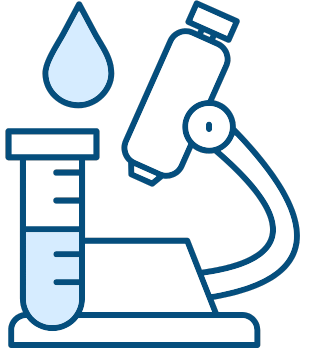Weak immune system, constant fatigue, muscle and back pain, low mood. These symptoms, often exacerbated during the cold season, may indicate a deficiency of one simple but essential element, vitamin D. Vitamin D is an extremely important and vital element for the proper functioning of the human body. However, many people in the world suffer from vitamin D deficiency, especially those living in colder climates where there is little sun. Sometimes a deficiency of this element, also known as the ‘sunshine vitamin’, makes us feel unwell and irritable. In this article, Drops Clinic family clinic specialists will introduce you to the benefits of vitamin D for the body, how to recognise and diagnose vitamin D deficiency, how to treat it and how to avoid vitamin D overload and the most common mistakes when taking this vitamin.
What are the benefits of vitamin D for the body?
The benefits of vitamin D to the body are enormous and it is essential for many vital functions. Unlike other vitamins, it acts like a hormone, and many cells in the body have receptors to absorb the vitamin. In the body, vitamin D is involved in a variety of processes, but the most important need for vitamin D in the body is:
- for the absorption of calcium and phosphorus in the body,
- to support the nervous and immune systems,
- maintaining healthy muscles and bones.
In addition to its basic functions in the body, vitamin D may be useful in reducing the growth of cancer cells, helping to control infections and reduce inflammation. Vitamin D can also have an impact and play an important role in reducing the risk of obesity and the development of serious diseases, especially heart disease and multiple sclerosis (MS).
Our servicesSymptoms of vitamin D deficiency
Vitamin D deficiency can affect the whole body. However, the symptoms are usually very subtle, and many people don’t even realise that vitamin D deficiency is at the root of all their problems. When the body does not get enough vitamin D, symptoms can range from pain to mood changes. The most common signs of vitamin D deficiency are:
- Recurrent colds and infectious diseases often indicate a severe vitamin D deficiency, which is essential for maintaining the immune system. Vitamin D interacts directly with the cells responsible for fighting infection. With the onset of the cold season and the decrease in sunshine, vitamin D deficiency increases the incidence of colds and infectious diseases. Therefore, it is important to take into account the level of vitamin D in the body in order to reduce the risk of upper respiratory tract infections.
- Fatigue and lack of energy are some of the more subtle signs of vitamin D deficiency, but are equally rare. Although fatigue can be caused by many reasons, often the source of the problem lies in vitamin D deficiency. Vitamin D deficiency can lead to poorer sleep quality, resulting in fatigue and lack of energy. Sometimes, a deficiency in the body can also lead to fatigue that affects the quality of life.
- Back and bone pain is one of the most common symptoms of vitamin D deficiency. Vitamin D improves the absorption of calcium, which is why a deficiency can lead to bone and back pain, especially in the lower back.
- The source of muscle pain is often difficult to identify. However, it is not uncommon for muscle pain to occur when the body is deficient in vitamin D. This is because the nerve cells that feel the pain have vitamin D receptors.
- Slow wound healing can also be a sign of a severe vitamin D deficiency, as the body’s lack of vitamin D impairs the production of compounds that are important for the formation of new skin. This is an important part of wound healing.
- Hair loss is associated with deficiencies of various substances, including vitamin D. Although stress is one of the main causes of hair loss, it is often due to nutrient deficiencies.
- Depression can also be a symptom of vitamin D deficiency, especially in older people. Vitamin D deficiency in adults has a negative effect on mood changes, leading to seasonal depression.

Excess vitamin D in the body
Although it is rare, excess vitamin D is also dangerous for our bodies. Excess vitamin D is most often caused by excessive use of vitamin D supplements over a long period of time, as it tends to build up in the body. An overdose of vitamin D can lead to elevated levels of calcium in the blood. Higher calcium levels increase the risk of kidney stones, kidney failure and cardiovascular damage. Excess vitamin D can also cause loss of appetite, thirst, constipation, nausea and frequent urination, and sometimes bone pain, muscle weakness or high blood pressure. If you experience headaches, nausea, vomiting or frequent urination, see your doctor and have your vitamin D and calcium levels checked.
Common mistakes when taking vitamin D
When taking vitamin D supplements or eating foods rich in vitamin D, it is important to avoid common mistakes that interfere with absorption:
- Do not take vitamin D on an empty stomach or with fat-free food. Vitamin D is a fat-soluble vitamin, so it is better absorbed with fatty foods.
- Do not take vitamin D with calcium supplements or foods high in calcium. Vitamin D by itself increases calcium levels in the blood. So extra calcium can lead to excessive levels of calcium in the blood and can adversely affect the kidneys and heart.
- Do not take vitamin D in the evening or at bedtime. Vitamin D can act as a stimulant and may interfere with sleep or disrupt the sleep cycle.
- Do not take vitamin D without medical advice or without following the prescribed dose. Vitamin D is important for the body, but inappropriate use of vitamin D supplements can be detrimental to health.
Vitamin D deficiency is a widespread problem, especially in colder climates, and can cause a wide range of symptoms in our bodies. Severe vitamin D deficiency in the body can lead to a weakened immune system, persistent fatigue, muscle and back pain and even low mood. Vitamin D plays a crucial role in maintaining vital bodily functions such as calcium and phosphorus uptake in the body, the maintenance of the nervous and immune systems and the maintenance of healthy muscles and bones. Vitamin D deficiency can be diagnosed by a blood test and can be cured by taking vitamin D supplements. If you constantly feel s




